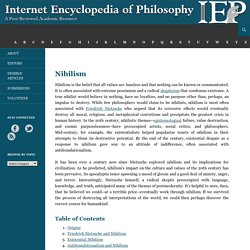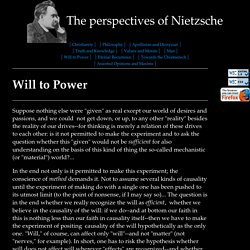

40 Belief-Shaking Remarks From a Ruthless Nonconformist. If there’s one thing Friedrich Nietzsche did well, it’s obliterate feel-good beliefs people have about themselves.

He has been criticized for being a misanthrope, a subvert, a cynic and a pessimist, but I think these assessments are off the mark. I believe he only wanted human beings to be more honest with themselves. He did have a remarkable gift for aphorism — he once declared, “It is my ambition to say in ten sentences what others say in a whole book.” A hundred years after his death, Nietzsche retains his disturbing talent for turning a person’s worldview upside-down with one jarring remark.
Even today his words remain controversial. Here are 40 unsympathetic statements from the man himself. 1. 2. 3. 4. 5. 6. Why Study Philosophy? 'To Challenge Your Own Point of View' - Hope Reese. At a time when advances in science and technology have changed our understanding of our mental and physical selves, it is easy for some to dismiss the discipline of philosophy as obsolete.

Stephen Hawking, boldly, argues that philosophy is dead. Not according to Rebecca Newberger Goldstein. Goldstein, a philosopher and novelist, studied philosophy at Barnard and then earned her Ph.D. in philosophy at Princeton University. She has written several books, won a MacArthur “Genius Award” in 1996, and taught at several universities, including Barnard, Columbia, Rutgers, and Brandeis. Goldstein’s forthcoming book, Plato at the Googleplex: Why Philosophy Won’t Go Away, offers insight into the significant—and often invisible—progress that philosophy has made. You came across The Story of Philosophy by Will Durant as a kid. I grew up in a very religious Orthodox Jewish household and everybody seemed to have firm opinions about all sorts of big questions. It made my mother intensely uncomfortable. Nihilism Nihilism is the belief that all values are baseless and that nothing can be known or communicated.

It is often associated with extreme pessimism and a radical skepticism that condemns existence. A true nihilist would believe in nothing, have no loyalties, and no purpose other than, perhaps, an impulse to destroy. While few philosophers would claim to be nihilists, nihilism is most often associated with Friedrich Nietzsche who argued that its corrosive effects would eventually destroy all moral, religious, and metaphysical convictions and precipitate the greatest crisis in human history.
In the 20th century, nihilistic themes--epistemological failure, value destruction, and cosmic purposelessness--have preoccupied artists, social critics, and philosophers. Mid-century, for example, the existentialists helped popularize tenets of nihilism in their attempts to blunt its destructive potential. Nietzsche Quotes: Will to Power.
Suppose nothing else were "given" as real except our world of desires and passions, and we could not get down, or up, to any other "reality" besides the reality of our drives--for thinking is merely a relation of these drives to each other: is it not permitted to make the experiment and to ask the question whether this "given" would not be sufficient for also understanding on the basis of this kind of thing the so-called mechanistic (or "material") world?...

In the end not only is it permitted to make this experiment; the conscience of method demands it. Not to assume several kinds of causality until the experiment of making do with a single one has been pushed to its utmost limit (to the point of nonsense, if I may say so)... From Beyond Good and Evil, s.36, Walter Kaufmann transl. from The Will to Power, s.635, Walter Kaufmann transl. Study Guide for Nietzsche's Thus Spoke Zarathustra. Using this Guide My essay on The Influence of Nietzsche List of other study guides The Nietzsche Page (Great resources for the study of Nietzsche) Friedrich Nietzsche is one of the most influential philosophers of the nineteenth century; but he was not influential in the nineteenth century.

(See notes on the influence of Nietzsche.) There are certain central concepts that it is essential to keep in mind about Nietzsche's philosophy. A final obstacle to comprehension is the simple aversion that his style arouses in some readers. Everyone finds something to object to in Nietzsche. The numbers in the notes below refer to the section numbers in the Penguin edition of Kaufman's translation. Zarathustra's Prologue 1: What other famous figure began his mission at the age of thirty by retreating into the wilderness? 2: The Old Man represents traditional religious hermitism. 5: What is Zarathustra's explanation for the fact that the people do not welcome his message? Zarathustra's Speeches. Study Guide for Nietzsche's Thus Spoke Zarathustra.